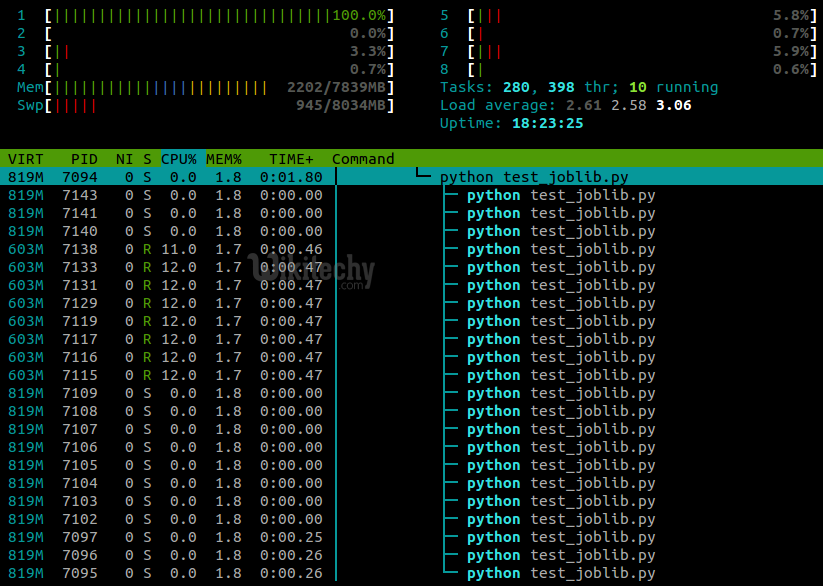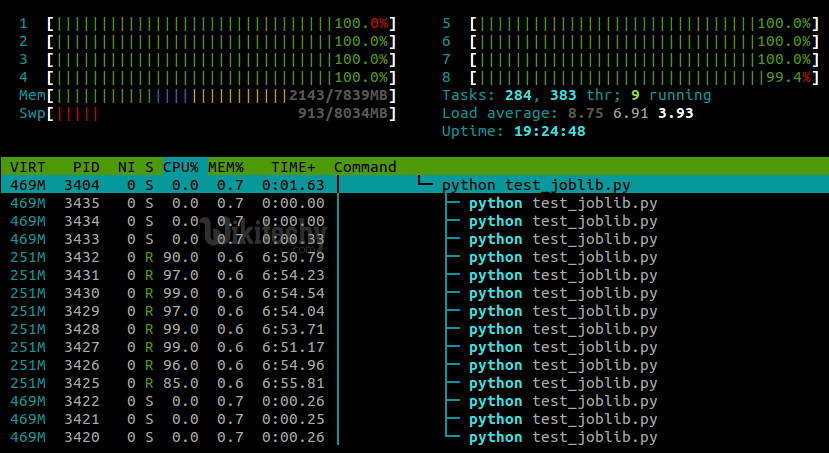linux - [Solved-3 Solutions] Why does multiprocessing use only a single core after I import numpy ? - ubuntu - red hat - debian - linux server - linux pc
Linux - Problem :
from joblib import Parallel,delayed
import numpy as np
def testfunc(data):
# some very boneheaded CPU work
for nn in xrange(1000):
for ii in data[0,:]:
for jj in data[1,:]:
ii*jj
def run(niter=10):
data = (np.random.randn(2,100) for ii in xrange(niter))
pool = Parallel(n_jobs=-1,verbose=1,pre_dispatch='all')
results = pool(delayed(testfunc)(dd) for dd in data)
if __name__ == '__main__':
run()click below button to copy the code. By - Linux tutorial - team
Here's you can see in htop while this script is running:

Learn Linux - Linux tutorial - Script running - Linux examples - Linux programs
Linux - Solution 1:
- It turns out that certain Python modules (numpy, scipy, tables, pandas, skimage) mess with core affinity on import.
- This problem seems to be specifically caused by them linking against multithreaded OpenBLAS libraries.
- To reset the task affinity using the following code:
os.system("taskset -p 0xff %d" % os.getpid())click below button to copy the code. By - Linux tutorial - team
After the module imports, runs on all cores:

Learn Linux - Linux tutorial - multiprocessing number of cores - Linux examples - Linux programs
This doesn't seem to have any negative effect on numpy's performance, although this is probably machine- and task-specific .
There are also two ways to disable the CPU affinity-resetting behaviour of OpenBLAS itself. At run-time you can use the environment variable OPENBLAS_MAIN_FREE (or GOTOBLAS_MAIN_FREE), for example
OPENBLAS_MAIN_FREE=1 python myscript.pyclick below button to copy the code. By - Linux tutorial - team
Alternatively, if you're compiling OpenBLAS from source you can permanently disable it at build-time by editing the Makefile.rule to contain the line
NO_AFFINITY=1click below button to copy the code. By - Linux tutorial - team
Linux - Solution 2:
You can try this:
>>> import os
>>> os.sched_getaffinity(0)
{0, 1, 2, 3}
>>> os.sched_setaffinity(0, {1, 3})
>>> os.sched_getaffinity(0)
{1, 3}
>>> x = {i for i in range(10)}
>>> x
{0, 1, 2, 3, 4, 5, 6, 7, 8, 9}
>>> os.sched_setaffinity(0, x)
>>> os.sched_getaffinity(0)
{0, 1, 2, 3}click below button to copy the code. By - Linux tutorial - team
Linux - Solution 3:
This appears to be a common problem with Python on Ubuntu, and is not specific to joblib:
- Both multiprocessing.map and joblib use only 1 cpu after upgrade from Ubuntu 10.10 to 12.04
- Python multiprocessing utilizes only one core
- multiprocessing.Pool processes locked to a single core
